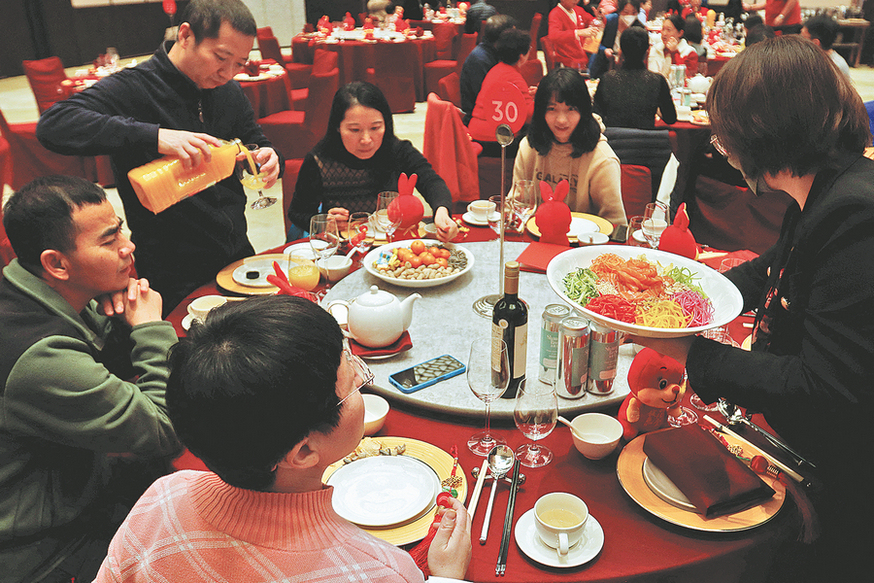

Catering businesses in China have started to roar back to life after the country optimized its pandemic prevention and control measures in late December.
The government has ended the requirement for mass testing and people do not need to show their health code when entering public places like shopping malls and restaurants.
During the Spring Festival holiday from Jan 21 to 27, many restaurants in Beijing saw a surge in sales revenue compared with the same period of 2022.
People celebrated the Lunar New Year of the Rabbit with strong consumer sentiments; the figures of some restaurants have even exceeded those of the Spring Festival holiday in pre-COVID-19 times.
A spokesperson from catering giant Judehuatian Group said diners had swarmed into the group's time-honored brand restaurants including Hongbinlou, Kaorouwan and E'meijiujia on Jan 21, the Chinese New Year's Eve. All the hall tables were occupied at around 10 o'clock in the morning, with many people waiting in line for seats.
Cuihualou, another time-honored restaurant in the Chinese capital, sold nearly 100 takeout meal packages on Spring Festival eve — traditionally marked by family gatherings and sumptuous dishes — an increase of 60 percent year-on-year.
Wang Peixin, general manager of the restaurant, said during this year's weeklong Spring Festival holiday, the turnover of Cuihualou was about 30 percent higher than the same period of 2022. The restaurant almost reached the upper limit of its seating capacity from the first day to the fifth day of Lunar New Year. The waiting time also rose to 80 minutes on average.
Moreover, Cuihualou had to double the ingredients of its best-selling dishes, such as fried fish with secret sauce, Dongpo braised pork and diced chicken in bean sauce, to cope with the flow of customers during the holiday.
Hotpot chain Donglaishun also saw brisk sales during the holiday. Its 18 directly operated stores in Beijing achieved a total revenue of 7.75 million yuan ($1.15 million) in the seven days, up 135 percent year-on-year. Other stores in shopping malls and scenic spots across the city also broke sales records since 2022.
Food deliveries have seen robust growth in sales nationwide during Spring Festival. According to Meituan Waimai, a major Chinese food delivery platform, Beijing, Xi'an, Guangzhou, Chongqing and Shanghai became the top five cities in food delivery sales during the holiday.
Sales of takeaway dishes in the tourist city Xi'an, for example, increased by 62.84 percent from the same period of 2022. Meanwhile, Chongqing saw a year-on-year surge of 219.78 percent.
Although the Spring Festival holiday is over, many restaurant owners said they are ready to embrace consumption peaks on the day of the"Start of Spring" — the first of the 24 solar terms in the traditional Chinese calendar — which falls on Saturday, and Lantern Festival on Sunday.
During Lantern Festival, people usually eat small glutinous rice balls known as yuanxiao or tangyuan, depending on different production methods.
According to the time-honored brand Jinfang Snacks, an increasing number of consumers have started to buy its yuanxiao since the last two days of the Spring Festival holiday. This year, yuanxiao made by Jinfang Snacks can be purchased in more than 100 outlets of the supermarket Wumart in Beijing and also on Wumart's Dmall digital platform.
haonan@chinadaily.com.cn